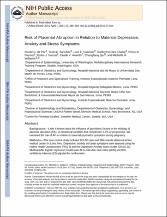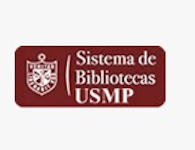| dc.contributor.author | de Paz, Nicole C. | |
| dc.contributor.author | Sanchez, Sixto E. | |
| dc.contributor.author | Huaman, Luis E. | |
| dc.contributor.author | Diez Chang, Guillermo | |
| dc.contributor.author | Pacora, Percy N. | |
| dc.contributor.author | Garcia, Pedro J. | |
| dc.contributor.author | Ananth, Cande V. | |
| dc.contributor.author | Qiu, Chungfang | |
| dc.contributor.author | Williams, Michelle A. | |
| dc.date.accessioned | 2020-07-17T15:53:39Z | |
| dc.date.available | 2020-07-17T15:53:39Z | |
| dc.date.issued | 2011-04 | |
| dc.identifier.citation | de Paz NC., Sanchez SE., Huaman LE., Chang GD., Pacora PN., Garcia PJ., et al. Risk of placental abruption in relation to maternal depressive, anxiety and stress symptoms. J Affect Disord. 2011; 130(1-2): 280-284. | es_PE |
| dc.identifier.uri | https://hdl.handle.net/20.500.12727/6357 | |
| dc.description.abstract | Background
Little is known about the influence of psychiatric factors on the etiology of placental abruption (PA), an obstetrical condition that complicates 1–2% of pregnancies. We examined the risk of PA in relation to maternal psychiatric symptoms during pregnancy.
Methods
This case–control study included 373 PA cases and 368 controls delivered at five medical centers in Lima, Peru. Depressive, anxiety and stress symptoms were assessed using the Patient Health Questionnaire (PHQ-9) and the Depression Anxiety Stress Scales (DASS-21). Multivariable logistic regression models were fit to calculate odds ratios (aOR) and 95% confidence intervals (CI) adjusted for confounders.
Results
Depressive symptoms of increasing severity (using the DASS depression subscale) was associated with PA (p for trend = 0.02). Compared with women with no depressive symptoms, the aOR (95%CI) for PA associated with each level of severity of depression symptoms based on the DASS assessment were as follows: mild 1.84 (0.91–3.74); moderate 1.25 (0.67–2.33); and severe 4.68 (0.98–22.4). The corresponding ORs for mild, moderate, and moderately severe depressive symptoms based on the PHQ assessment were 1.10 (0.79–1.54), 3.31 (1.45–7.57), and 5.01 (1.06–23.6), respectively. A positive gradient was observed for the odds of PA with severity of anxiety (p for trend = 0.002) and stress symptoms (p for trend = 0.002).
Limitations
These cross-sectionally collected data may be subject to recall bias.
Conclusions
Maternal psychiatric disorders may be associated with an increased occurrence of AP. Larger studies that allow for more precise evaluations of maternal psychiatric health in relation to PA risk are warranted. | es_PE |
| dc.format.extent | pp. 280-284 | es_PE |
| dc.language.iso | eng | es_PE |
| dc.publisher | Elsevier | es_PE |
| dc.relation.ispartof | urn:issn:1471-2431 | |
| dc.relation.ispartofseries | Journal of Affective Disorders;vol. 130, no. 1-2 | |
| dc.relation.uri | https://www.ncbi.nlm.nih.gov/pmc/articles/PMC2994998/ | es_PE |
| dc.relation.uri | https://doi.org/10.1016/j.jad.2010.07.024 | es_PE |
| dc.rights | info:eu-repo/semantics/openAccess | es_PE |
| dc.rights.uri | https://creativecommons.org/licenses/by-nc-nd/4.0/ | es_PE |
| dc.source | Repositorio Académico USMP | es_PE |
| dc.source | Universidad San Martín de Porres - USMP | es_PE |
| dc.subject | Desprendimiento prematuro de la placenta | es_PE |
| dc.subject | Epidemiología | es_PE |
| dc.subject | Embarazo | es_PE |
| dc.subject | Depresión | es_PE |
| dc.subject | Ansiedad | es_PE |
| dc.subject | Factores de riesgo | es_PE |
| dc.title | Risk of placental abruption in relation to maternal depressive, anxiety and stress symptoms | es_PE |
| dc.type | info:eu-repo/semantics/article | es_PE |
| thesis.degree.name | Medicina Humana | es_PE |
| thesis.degree.grantor | Universidad de San Martín de Porres. Facultad de Medicina Humana | es_PE |
| thesis.degree.discipline | Medicina | es_PE |
| dc.subject.ocde | https://purl.org/pe-repo/ocde/ford#3.02.00 | es_PE |








